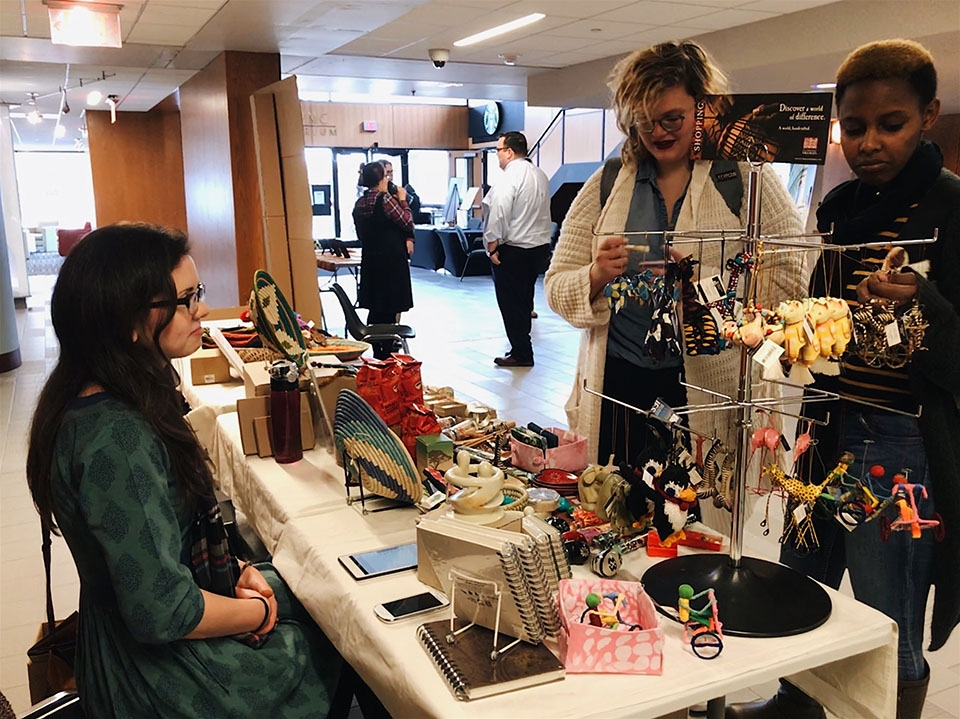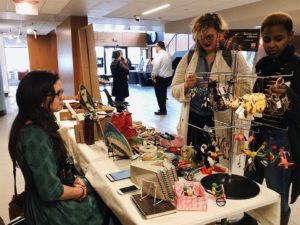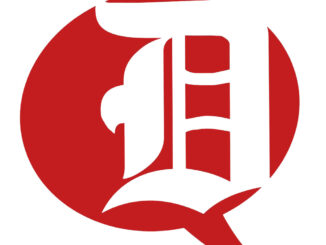
Students check out a table of African jewelry and trinkets in the Union as part of Africa Week. This yearly celebration looks at Duquesne’s connections to the continent and offers students a variety of speakers and other African activities on campus.

Students check out a table of African jewelry and trinkets in the Union as part of Africa Week. This yearly celebration looks at Duquesne’s connections to the continent and offers students a variety of speakers and other African activities on campus.
Sairah Aslam | Staff Writer
11/02/17
Africa Week took place recently on the Bluff. Hosted and organized by the Center of African Studies and the Union of African Students, among other groups, the three-part program showcased events geared toward engaging the politically inclined, the college consumer and even the casual observer mildly interested in diversity.
The third annual celebration of Africa began with a seminar on United States public policy regarding the continent, presented by Ambassador Faida Mitifu, Krobo Edusai, Jr. and Bernadette Paolo on Oct. 24th. Paolo is a Scholar-in-Residence at Duquesne University and has considerable credentials: She served on the Presidential Trade Advisory Committee for Africa under both George W. Bush and Barack Obama, worked on Capitol Hill for 12 years (including 10 on the Committee of Foreign Affairs), represented The Africa Society at the National Summit on Africa as CEO and President, and was selected last year as one of 47 Harvard Leadership Fellows worldwide.
Paolo drew from her plethora of connections and experience to arrange for the appearances of Mitifu, an ambassador to the United States from the Democratic Republic of the Congo and Dean of the African Republic Core, and Edusai, Jr., an entrepreneurial philanthropist currently making advances in sustainability. Both, Ms. Paolo earnestly said, “epitomize the incredible leaders that can be found in every country.”
Endeavoring to engage every member of the Duquesne community, the Center of African Studies (CAS) also hosted a Taste of Africa Marketplace event on Oct. 25. Participants listened to musicians’ expressions of their national pride on traditional instruments, tasted ethnic fried food and yogurt and bought various African wares.
The final event, dubbed Our Motherland by members of the Union of African Students, took place on Oct. 26. In late September, these students began arranging the performances, poetry readings, music, food, fashion show and other attractions that characterized the event. A month in the making, many students prided the event on its ability to showcase some of the value, reality and diversity of African culture.
Vice President Larissa Koumaka of UAS is one such student.
“[We host] Our Motherland to educate and inform the Duquesne community about all Africa has to offer in the way of culture and traditions,” she said.
Being aware and open-minded of diversity, she emphasized, is essential to everyone’s experience — particularly college students’.
Koumaka’s opinion is strongly corroborated among many of the students involved with organizing and promoting Africa Week.
“It’s important to be open-minded … so that when you get into the real world, you won’t be awkward dealing with people with different backgrounds. You will have done it before,” Natalia Davila, a work-study student in CAS, said.
Marie Karigiwa, a member of UAS, also points out that Africa Week helps bring a temporary sense of familiarity for African students.
“It kind of lets us go home for a day … and Our Motherland is a different way of presenting Africa, because we are actually bringing our experiences here. It makes it more authentic,” she said.
Leah Shiferaw, another member of UAS, summed the experience all up.
“It’s a great way to share stuff I love about being African … we’re fun and lively,” she said, “and through Motherland, I hope people get to appreciate Africa as much as we do.”



